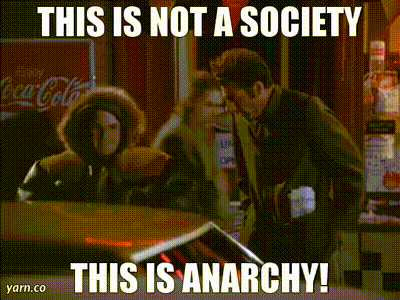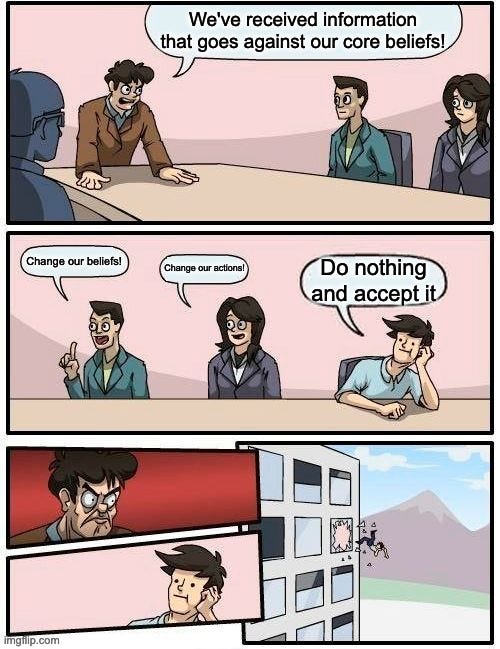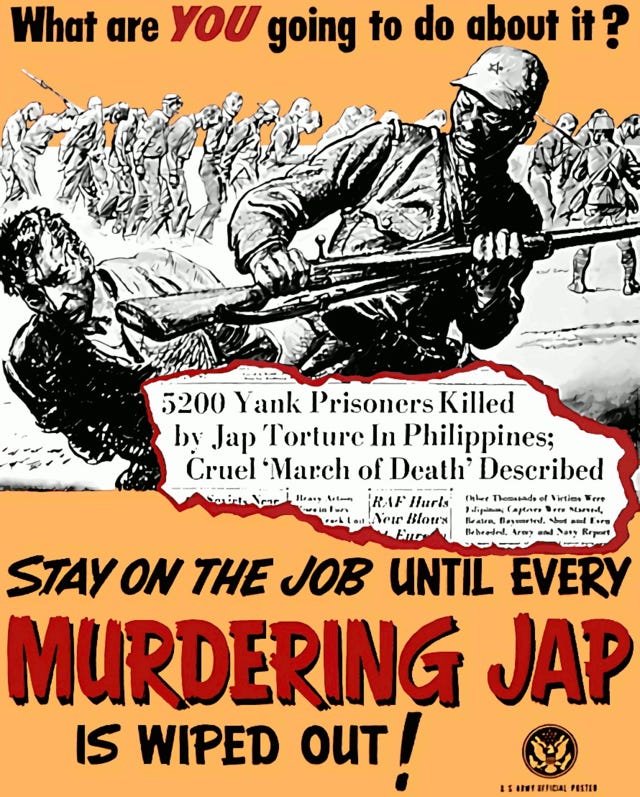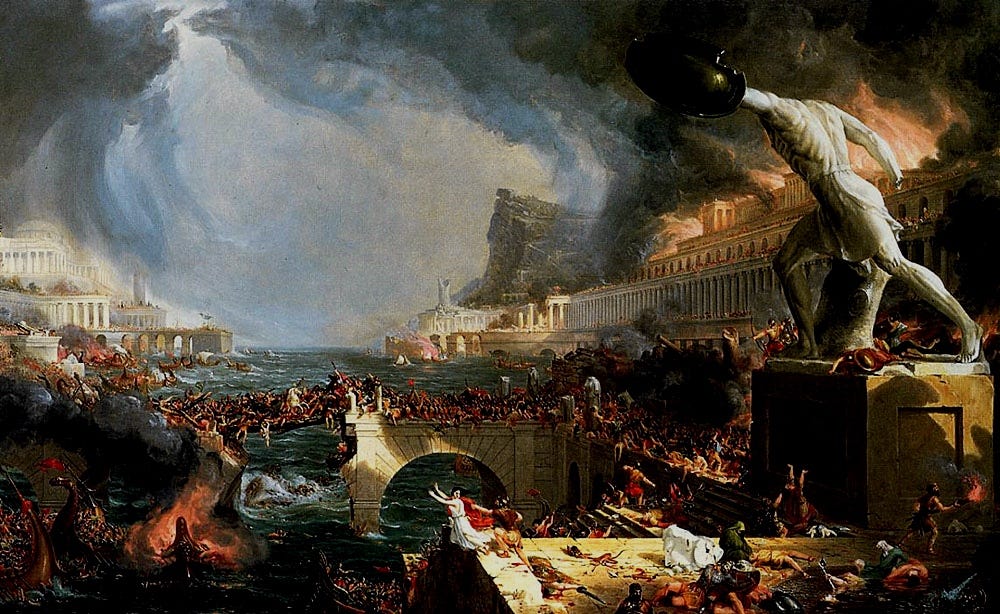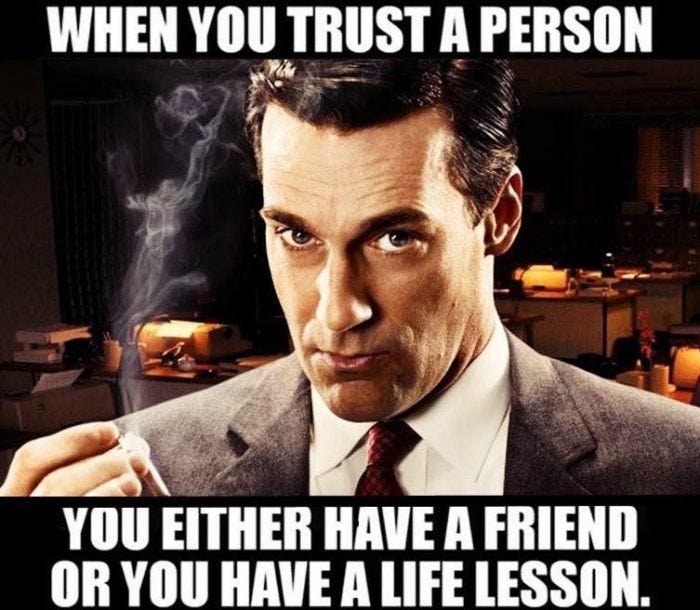How morality works
Plus, China's moral system vs. America's moral system O.J. Simpson's endorsement deals, double dipping, the best way to get people to cooperate, why Italians don't trust each other, and more.
Imagine that your hometown gets rid of all its laws. Everything — murder, rape, theft, arson, drunk driving, wire fraud, you name it — becomes legal. You can get away with anything.
You go out and a gang of thieves beats you within an inch of your life, breaks a bunch of your bones, and steals all your stuff. Then you get back to your house, only to find that someone set it on fire, and it's burnt to the ground.
Now you're severely injured, with no money and no place to sleep.
That would kind of suck, right?
Let's say that by some miracle, you survive. You get a new place to live. You resolve to stay at that new place to live all day long and defend it with a shotgun. In the new, lawless world you live in, that's the only safe thing to do.
All your friends start doing the same thing. Pretty soon, life in the town comes to a screeching halt. Nobody can start a business, go bowling, drink a beer with their friends, or do anything else other than just defend their property with a shotgun all day long. Because it's not safe out there.
That's what the world would look like without some sort of moral system. Everybody would have to spend all their time defending their family and their stuff, so they wouldn't be able to go out in the world and do anything. Large construction projects, business ventures, baseball leagues, and pretty much everything else would be impossible, because everybody would expect to get screwed over anytime they did anything.
Human society is only possible because we have morals.
The purpose of morals is to make people trust each other. When you know that people aren't gonna kill you, steal from you, break their promises to you, et cetera, it becomes a lot easier to be friends with them, drink with them, travel with them, and do business with them.
The more people can trust each other, the better society gets. Economists have found that countries where people trust each other have higher GDP's than countries with the same geography, population, natural resources, etc. but lower trust. When people trust each other, the world is better.
Luckily, humans have evolved a complex moral system. That complex moral system allows us to get along with each other better than any other non-insect animal on the planet. But it's not perfect.
This article is about how it works.
What makes people moral?
Imagine that you got really drunk one night and cut somebody’s head off with an axe. Then you woke up the next morning, with the vivid memory of swinging the axe into the guy's head, his head falling off, blood spouting all over the place, onlookers screaming, et cetera. How would you feel?
Most people would probably feel a combination of intense shame, guilt, and disgust.
Those emotions — shame, guilt, and disgust — make us more likely to do the right thing. A lot of people won't shoplift even if they know they'd get away with it, because they'd feel guilty. Similarly, some people wouldn't cheat on their spouse because it would make them feel gross. Et cetera.
This is also why we don’t trust people who don’t feel emotions. Cold, unfeeling people are way more likely to be sociopaths, because they don't have the same inhibitions about doing bad things as normal people.
Where do our moral emotions come from? Some combination of nature and nurture. On one hand, human beings everywhere have a revulsion to things like betraying friends, incest, murdering people for no reason, et cetera. On the other hand, there's wide cultural variation in what behaviors are considered immoral.
For example, if you grew up in a super conservative household, you may feel shame, guilt, and disgust every time you have premarital sex. Lots of people talk about how awful and dirty they feel after they have casual sex. I wasn't raised with those values, so I don't have that attitude. But I do feel shame, guilt, and a little bit of disgust when I feel I haven’t treated somebody well enough.
People’s moral beliefs generally evolve over the course of their lives so that they can do what they have to do without feeling guilt, shame, and disgust when they do it. Sometimes for the better and sometimes for the worse.
For example, when I worked as a door-to-door salesman, I started out with a bit of an ethical issue with knocking on a stranger’s door and selling them something. So I spent a lot of time coming up with theories about why door-to-door sales is actually okay.
This is called "cognitive dissonance". Basically, people will rationalize themselves into believing that whatever they're doing is the right thing. Their beliefs about right and wrong will change based on what they want to do.
Internal Morality vs. External Morality
If you cut somebody's head off with an axe, in addition to feeling shame, guilt, and disgust, you would also probably feel fear about what society would do about it.
You would be worried that the cops would take you away in handcuffs and send you to the electric chair. Or that a family member of the guy you killed would show up at your house and cut your head off with an axe.
That's external morality. Basically, external morality is when you do the right thing because you're afraid society will punish you, not because you want to do the right thing for its own sake.
It seems likely that external morality is more motivating than internal morality. In Montreal in 1969, the entire police force went on strike. Within one day, there were riots and looting all over the city. People committed all the crimes they felt like committing because they knew they were gonna get away with them.
The level of internal morality versus external morality varies from culture to culture. China's moral system is largely based on shame, so doing the right thing means doing what society wants you to do. This is why everyone went along with the Cultural Revolution in China. In the West, people are supposed to have their own moral principles, which is why so many people stand up to stuff like the social justice movement. In China doing what society thinks is right is right, in America doing what you think is right is right.
Now, let's say you do something only a little bit wrong, like double dipping your chip into guacamole at a cocktail party. Nobody's gonna kill you or throw you in jail for that — it's not worth it.
So what will they do? They'll socially shame you.
People use social shaming as a means of enforcing their culture's rules. Being socially shamed is extremely uncomfortable, so social shame is an effective disincentive against bad behavior.
A good example of someone who got socially shamed is O.J. Simpson. O.J. was acquitted of double homicide, but he was convicted by the "court of public opinion". As such, after his acquittal he was no longer offered cameo roles in movies or endorsement deals.
Another mechanism people use to enforce good behavior is gossip. If you do anything bad, people will gossip about it, so everyone will know about it. Humans evolved to enjoy gossip so that they can more easily figure out who they should trust.
Social shaming is extremely painful for people, so much so that it even hurts to be socially shamed by complete strangers. Imagine if you go on vacation by yourself to a place where nobody knows you. One night, you get so drunk at a bar that you start peeing all over the tables.
The whole bar starts booing you, and the bouncer throws you out. The next day, you return home. None of your friends know what happened, and nothing you did will have any repercussions on your life. You probably still feel ashamed and afraid.
Ingroups
Nassim Taleb has a quote in his book Skin In The Game about his moral principles. It says “with my family, I'm a communist. With my close friends, I'm a socialist. At the local level of politics, I'm a Democrat. At the state level, I'm a Republican. And at the federal level, I'm a libertarian.”
This is the way most people feel: the more ties you have with somebody, the more you're willing to sacrifice to help them. If one of your close friends asks you for a big favor, you’ll do it without thinking twice. If some random person on the street asks you for a favor, you'll probably keep walking.
In another chapter of Skin In The Game, Taleb talks about "The Swiss". In Taleb's trading world, The Swiss is basically any outgroup member for whom it's generally accepted that it's okay for people to scam.
This is how most communities deal with morality: they protect their own, they protect members of groups that they're allied with, and everybody else is "The Swiss". For example, in many parts of the world, you're allowed to scam tourists, but you're not allowed to scam locals.
Why is it considered okay to scam a tourist, but not a local? Because doing immoral stuff to strangers or to members of an outgroup doesn't necessarily signal to people in your community that you would do it to them. Just because you're willing to steal from a stranger doesn't mean you're willing to steal from a close friend — your close friend is more valuable to you than the stranger. So if your close friend watches you steal from a stranger, he doesn't necessarily watch his wallet more closely.
Now, imagine your close friend watches you steal from your own brother. He'll probably say to himself, "man, if that guy would steal from his brother, he would surely steal from me, too!" Then he'll keep a close eye on you, or maybe stop hanging out with you entirely. Because if you're willing to betray the people closest to you, who wouldn't you betray?
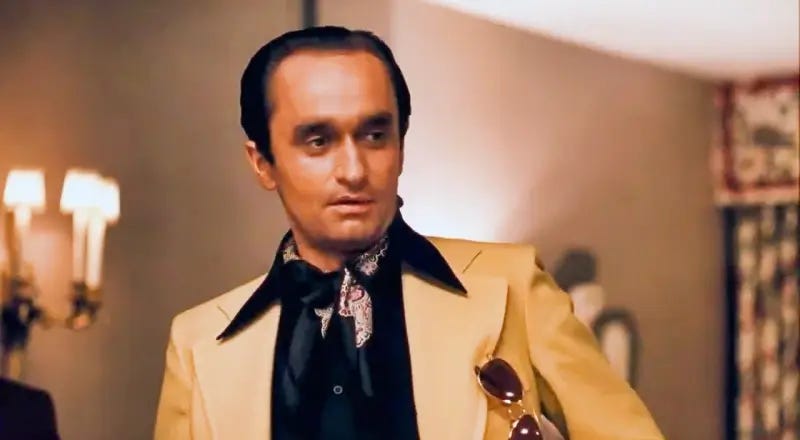
The story of human history is the story of us sorting ourselves into bigger and bigger ingroups. When we were evolving on the plains of Africa, our ingroup was basically us and our tribe — everyone else was a threat. But Ttday, many people consider everyone of their nationality or religion to be part of their ingroup. If you're Thai, many Thai people will consider you part of their ingroup; if you're Mexican, even some Frenchmen and Argentinians might consider you part of their ingroup. And some people consider every human to be at least tangentially a part of their ingroup.
Dehumanizing People
If you need to do really awful shit to somebody, it might not be enough to view them as "the Swiss". Most scammers wouldn't bat an eye at picking a tourist's pocket, but they'd feel way worse about murdering that same tourist. It's harder to feel good about murdering somebody than it is to feel good about stealing from them.
So what do you do if you need to, say, go to war and kill a bunch of people? How do you do that and live with yourself?
The most tried-and-true way to psychologically prepare yourself to do horrible crimes against humanity is to dehumanize your enemy as much as possible, so you don't feel bad about killing them.
In the book American Sniper, Chris Kyle, who had over 150 confirmed kills in the Iraq War, talked about how he had no sympathy for his enemy and viewed them as subhuman. This is the attitude you have to have when fighting a war. If he had had any sympathy for the Iraqi rebels, he might have hesitated before pulling the trigger, which could have cost him or one of this friends their lives.
The same thing happened during slavery in America. White Southerners created propaganda to get people to view Black people as subhuman, so they wouldn't feel so bad about keeping them as slaves. If the South had started to view Blacks as equals, the whole system of slavery would have seemed disgusting and inhuman to them and would have quickly collapsed.
How To Get People To Cooperate
Modern-day progressives and hippies believe that war can end forever if people "learn to cooperate".
Ironically, if you look at history, you see that people achieve the highest levels of cooperation during war. There's no better way to get people to band together than to give them an enemy that wants to kill them.
In Peter Turchin's book War And Peace And War, he argues that high-trust cultures are formed wherever one group of people has a fearsome and culturally alien enemy. The culture must develop asabiya to defeat the enemy (asabiya being a term that Islamic historian Ibn Khalduhn used to describe a high level of trust).
Once the enemy is defeated, the high-asabiya culture then goes on to form a world empire. The asabiya fades over time and is replaced by infighting, which eventually causes the empire to collapse.
This is why Italy, an ultra-cooperative place during the days of the Roman Republic, is one of the lowest-trust places in Europe today: their asabiya has faded and been replaced by corruption.
In other words, people only cooperate on a large scale if they have to in order to survive.
More evidence of this point: global cooperation started because of the threat of nuclear war. The United Nations was formed after the United States dropped the atomic bomb on Hiroshima and Nagasaki, and then everyone started freaking out about how to keep people from dropping more atomic bombs.
On the flipside, in the absense of a threat, people usually turn on each other. For example, America was a politically unified country during World War II, the Cold War, and after 9/11. Because both political parties were more afraid of Hitler, Russia, and Al-Qaeda than they were of each other, they worked together to keep the country safe.
But today, Americans generally feel they have no foreign enemies, so both Republicans and Democrats view each other as the primary enemy.
In other words, war and peace are kind of like yin and yang. They're opposites that need each other: you can't have one without the other. People only cooperate in order to defeat an enemy.
Moral objectivity
Westerners are raised to believe in “moral objectivity”, which is basically the idea that some things are objectively wrong and some things are objectively right.
This belief originally comes from Christianity. In Christianity, things are moral because of God. Today's western atheists don't believe in God, but they still generally believe in moral objectivity.
In Asia, they see morals differently. Morals are just the rules that everybody has to follow for society to work.
I think that the Asian perspective on morality is more factually correct. I don’t think that there’s some list of moral principles that the universe holds and then judges us by. Morals exist to benefit society, they're not abstract things.
The best proof of this is that morality has to change to adjust to different conditions in different eras of history. For example, in eras where sexual diseases run rampant, sexual mores usually get stricter. Meanwhile, in our era today, where we have condoms and STI testing, we're also more accepting and tolerant of casual sex and non-traditional relationships than ever before. That's because casual sex and non-traditional relationships don't do that much damage to our society today, as they did in the past. Today, the juice is worth the squeeze.
The benefit to the Asian perspective is that a society's morality can be more flexible, and more quickly adapt to a society's changing needs. Think of the way that in the 1800's, Japan completely transformed itself from isolationist to global power in 40 years: this is only possible when your moral code can change on a dime.
The drawback to the Asian perspective is that society can quickly go overboard and start doing dumb stuff. For example, Japan started a war it couldn't possibly win against the United States. And Chairman Mao made many reforms that were not for the best. This is where moral objectivity starts to shine: in a country like the United States, if someone like Chairman Mao came to power and started ordering lots of reforms, people would fight back.
What's the right thing to do?
I try to end each article with something uplifting and actionable, so let's talk about what you can do to be a better person.
Morality is a complex subject. There are different, equally valid ways of interpreting common moral rules of thumb, and there are exceptions to almost every rule. So I can't really cover it in a few paragraphs.
However, I'll give you a couple heuristics to follow.
The first is the Golden Rule: treat others the way you'd want them to treat you. If you follow that rule, you'll be alright most of the time.
On top of that, try not to do anything that would make people distrust you. Keep in mind Warren Buffett's maxim that a reputation takes 20 years to build and only a few minutes to destroy.
Finally, other people will not always live up to your standards, so be careful who you trust!
Hey! Thanks for reading.
My name's Theo and every other Monday I publish an article like this one. Usually it's about psychology or how society works.
If you enjoyed this article, you may also enjoy my article about how relationships work:
How relationships work
Danny told Amos that they weren’t friends anymore. Three days later, Amos called Danny and told him he had 3 months to live, so they’d better make up fast.
Or, you can hit the "subscribe now" button, and more of these posts will start popping up in your feed.
Happy trails!




